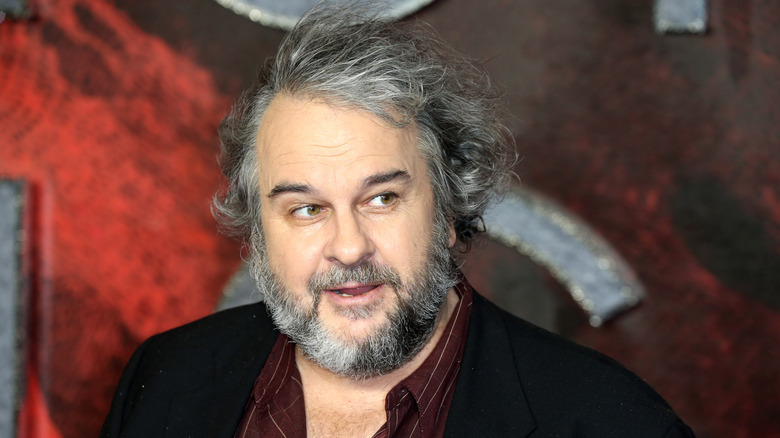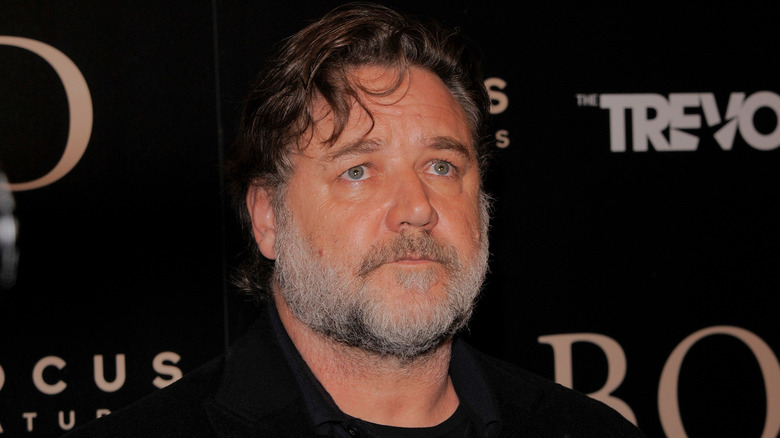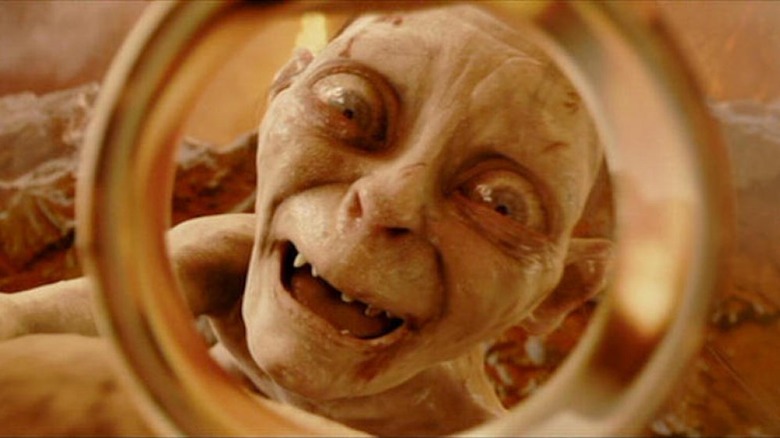Lord Of The Rings: The MCU Actor Peter Jackson Talked To About Playing Aragorn
It's hard to think of "The Lord of the Rings" without picturing its cast. The famous trilogy features a smorgasbord of actors — most of whom have become household names in the two decades since its release. While it's hard to imagine replacing them, many of the actors in Peter Jackson's trilogy only made the cut after other bigwig actors refused "Lord of the Rings" roles. Uma Thurman and Kate Winslet both declined to play Éowyn. Sean Connery and Christopher Plummer rejected the role of Gandalf as well. And a trio of massive names passed on playing Aragorn, including Nicolas Cage, Daniel Day-Lewis, and one other actor who has since gone on to grace the MCU with his god-like presence.
Russell Crowe, who played Zeus in 2022's "Thor: Love and Thunder," was offered the job of portraying Tolkien's famous exiled king in Jackson's three-part film project. Crowe was enormously popular at the time, and "Gladiator," arguably his most famous film foray, was released a short year and a half before "The Fellowship of the Ring" hit theaters at the end of 2001.
In an interview with Howard Stern, Crowe explained that, while he was a hot commodity at the time, he instinctually passed on the project, saying, "I didn't think Peter Jackson actually wanted me on the film. I think he was forced into talking to me because there was a moment in time when everybody wanted me in everything. And he's a fellow New Zealander, and I can hear his voice, and I'm talking to him on the phone, and I don't think he even knows what I've done. My instinct was that he had somebody else in mind, which turned out to be Viggo [Mortensen], and he should be allowed to hire the actor that he wants."
Crowe allegedly lost out on $100,000,000 turning down Aragorn
Yes, that's eight zeroes. Russell Crowe didn't just turn down the role of Aragorn. He also missed out on a massive share of the profits in the form of a tenth of the movie's gross revenue. "'The Lord of the Rings' you turned down?" Stern inquired. "And they offered you 10% ... of the gross of the movie. I did the math for you, so eat your heart out." Stern followed this up by informing the "Gladiator" star, "I don't mean to upset you, but I think you would have gotten $100 million from 10% of that movie."
When asked if it eats at the actor, Crowe answered, "Never thought about it — only in situations like interviews where people are polite and kind enough to add s*** up for me." The actor laughed off the situation — and while $100 million is nothing to scoff at, the truth is, Crowe's career hasn't skipped a beat since Jackson's trilogy came out. He's remained one of Hollywood's A-list actors and has even made the role call of acting greats who have landed cameo-size roles in Marvel films — not once, but twice.
The first role is the aforementioned portrayal of Zeus in "Thor: Love and Thunder." Along with the MCU's slapstick head of the Greek pantheon, Crowe is also lined up to play Nikolai Kravinoff, the villainous patriarch of the titular character in "Kraven the Hunter."
As if $100 million weren't enough, we fact-checked Stern's math and realized that the number may be off ... by quite a bit.
Could Crowe have gotten even more money for The Lord of the Rings?
If Crowe was really offered 10% of the gross money generated by the "Lord of the Rings" franchise, that total number isn't $1 billion. On the contrary, that's a rounded-down figure for the global box office run for just "The Return of the King" (which came in at over $1.1 billion). When you add all three films up, the total is closer to $3 billion. That would have put Crowe's total take closer to $300 million — and that number doesn't even include broadcast rights or DVD or memorabilia sales.
To be fair, it's unclear if Crowe's cut would have extended beyond the box office total. Actually, it isn't even certain if he really was in line for 10% of the gross total at all. While the actor confirmed this in the 2019 Stern interview, in 2011, The Telegraph reported on a talk Crowe gave at Durham University, with the news outlet writing that the Aussie superstar said the producers wanted to pay him "10 per cent of the profits instead of an upfront fee."
The use of the word "profits" could mean you have to take the production costs out of the equation. Technically, this is less than $100 million per film, although it's always hard to tell what is considered "profit" in Hollywood's wildly convoluted financial underbelly. Either way, it seems that Stern's $100 million estimate is quite low, all things considered.
Hindsight is always 20/20, and missing out on $100 million or more stings. But the truth is, Crowe has gone on to have one of the more successful careers in an industry racked with internal turmoil and filled with individuals by the thousands struggling to make it on the big screen.


